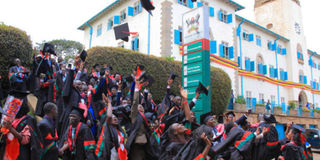Consider course content, not name

What you need to know:
Choosing to cut off one branch of education is not only an attack on education as a discipline but also an assumption that education stops with formal schooling
On March 31, 2021, the country woke up to yet another alarming headline from Makerere University, ‘Makerere scraps courses’. Restructuring of courses is indeed a good thing but must be underscored by genuine reasons. When I looked through the list, I noticed that most scrapped course were more of offshoots of retained mother courses like engineering and economics. That is perfectly fine. In fact, what is allegedly scrapped is actually retained as specialisations. My focus and surprise, however, is with the ‘scrapped’ Bachelor of Adult and Community Education (BACE).
Informal reports indicate that the course has been scrapped because there was close uniformity with the bachelor of Social Works and Social Administration (SWASA). Although both BACE and SWASA work with communities, their focus is different. Policy makers should have concerned themselves with course content and not course names. BACE is a multidisciplinary course whose speciality is education to adults in community settings. Adult and community education is a branch of education and nothing to do with social work. Education as a broad field has branches such as early child education (ECE), basic or primary education, secondary education, tertiary education (college/university and vocational), and finally adult and community education.
Choosing to cut off one branch of education is not only an attack on education as a discipline but also an assumption that education stops with formal schooling.
As global development efforts are keenly focused on the promotion of lifelong learning, Makerere University or Uganda at that should not be moving in the reverse gear. I am very sure that if Makerere University had consulted stakeholders such as UNESCO, German Development Association, line ministries (MoES and MoGLSD) and partner civil society, it would have been given proper guidance.
The world is confronted with numerous changes such as new diseases and pandemics, technologies, immigrations, internal conflicts etc. These changes require constant learning not only in schools but also in communities through adult learning. One may argue that health workers, or agriculturalists will do the teaching but they require special pedagogies to make impactful engagements with these adult community members.
Government, development partners and civil society have already done much in the effort to uplift adult learning and lifelong efforts in national development plans. The white paper on education 1992, which remains the most comprehensive government effort to streamline education in the country, proposed setting up National Council for Non-formal and Adult Education and a Directorate of Non-formal and Adult Education (MoES, 1992) under the Ministry of Education.
Indeed, these efforts are still on according to a recently concluded study. Therefore, efforts to revisit the white paper on education especially about what remains undone are ongoing. It is in no one’s interest for Makerere University to undermine such efforts.
Twine Bananuka, PhD




